What’s included in this month’s Pulse:
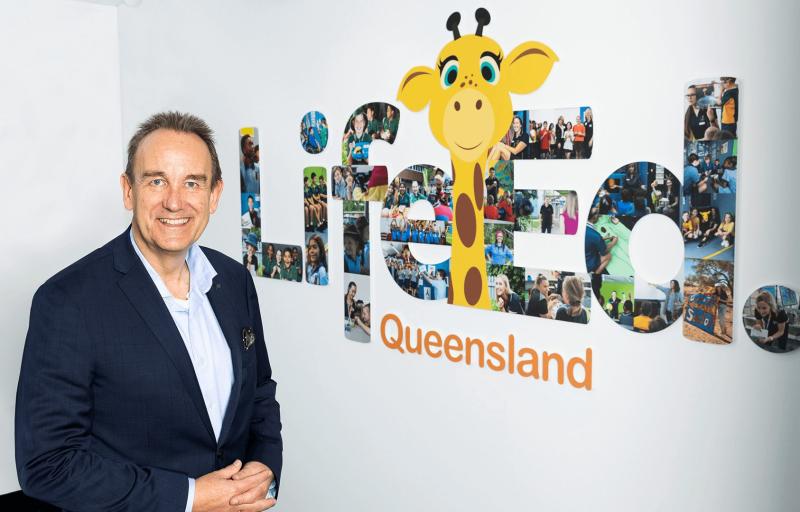
New data shows Australian teen cigarette smoking is increasing for the first time in 25 years.
Just as was feared, vapes have become a gateway to even more harmful smoking in the form of cigarettes; and doctors fear that new laws banning vape sales, although welcome, will make cigarette smoking seem like a viable alternative for more and more young people who choose to smoke.
It may be years before we fully understand the long-term health impacts of vaping. We know that vapes can contain up to 200 toxic chemicals including nicotine and formaldehyde.
That’s why it’s so encouraging to hear positive feedback from teachers and parents following the launch last month of our new Take a Breath vaping module. This is such important work at a time when vaping poses so many risks to our young people. Already, many hundreds of Queensland primary school students have participated in the program.
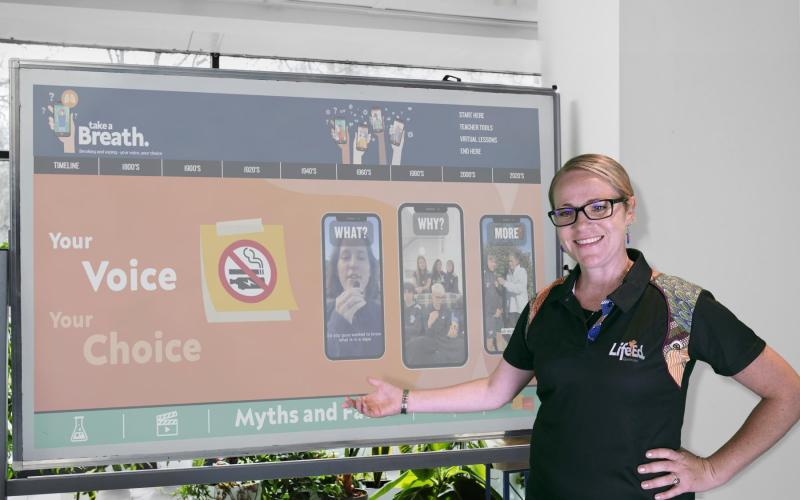
Teachers are telling us that students have gained new knowledge and strategies to avoid vaping in the future. In fact, 100 per cent of teachers said they learned something new themselves, along with their students.
These comments from a teacher and parent sum up the feedback we’re hearing:
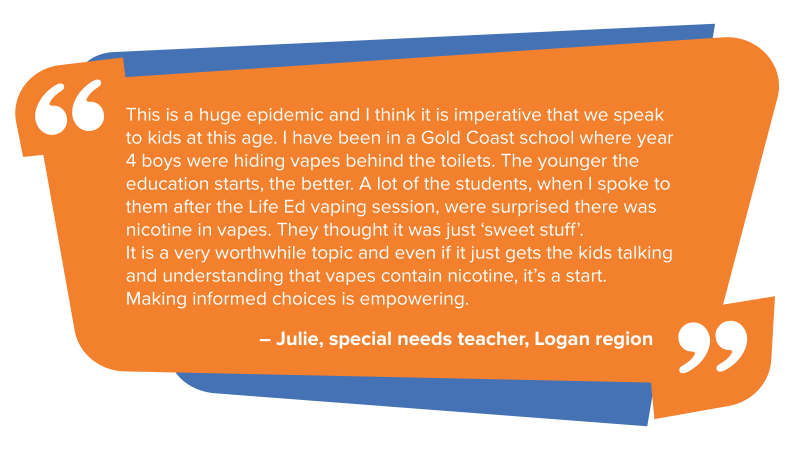
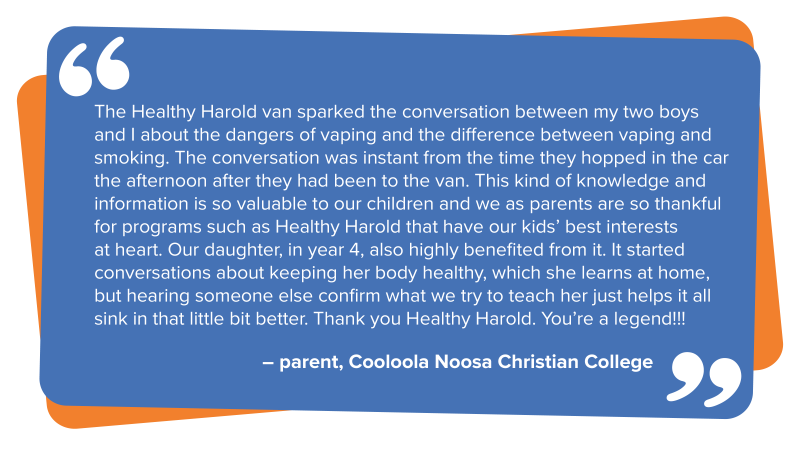
Whatever we can do to educate our young generation about the potential harms of smoking and vaping is vital to helping them make informed, healthy and safe choices for their future. Vapes should never be part of growing up for any child.
For more news about the new Take a Breath module see our recent media coverage.
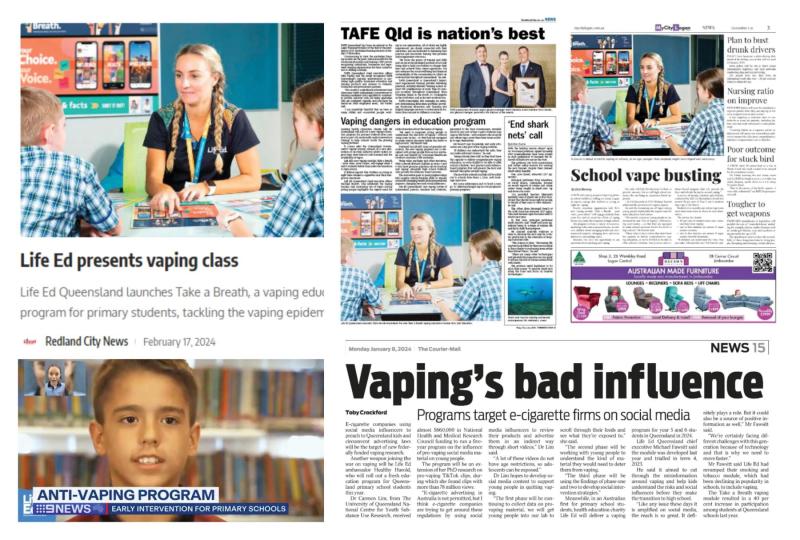
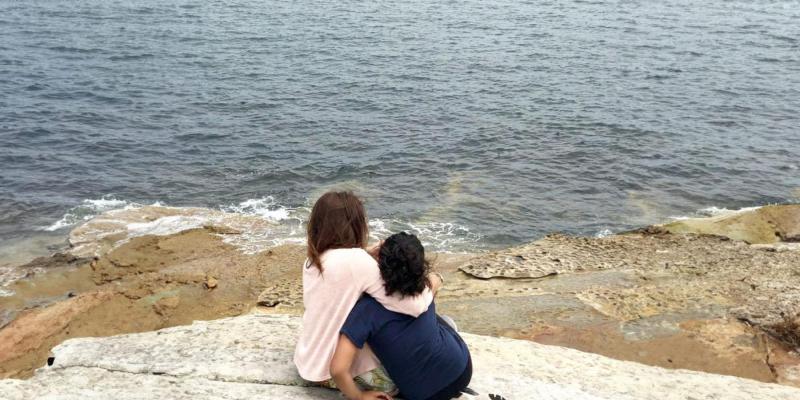
Minty was in Year 5 when the Talk About It program came to her Brisbane school. Her mother says the multi-faceted session could not have come at a better time. Her daughter was stressed and anxious about the body changes she was experiencing due to puberty.
“Minty started her periods just a few months before the session and she was having this identity crisis: she was not feeling comfortable in her body and with her body changes,” Mary says.
“I was letting her know that it’s okay and everybody goes through this and will have these body changes as well, but because she was the tallest in the class and the first one in her group to start menstruating, it was overwhelming.”
With its emphasis on fostering positive feelings around identity, puberty, body image and self-acceptance among young people, the Talk About It program was a turning point for Minty.
“There were two things that I noticed have really helped Minty – one was accepting her body; and the other thing was managing stress,” Mary explains.
“There are a lot of changes going on, so she would get angry and stressed at times, but those techniques really helped her. Now when she is stressed, she will take time out and listen to her favourite music, think about what happened and reflect on her responses and her reactions.
“It’s nice how she’s implemented the calming techniques for herself, but she’s also been explaining this to her younger brother and others as well, regarding how to manage emotions. I’m really proud of her.”
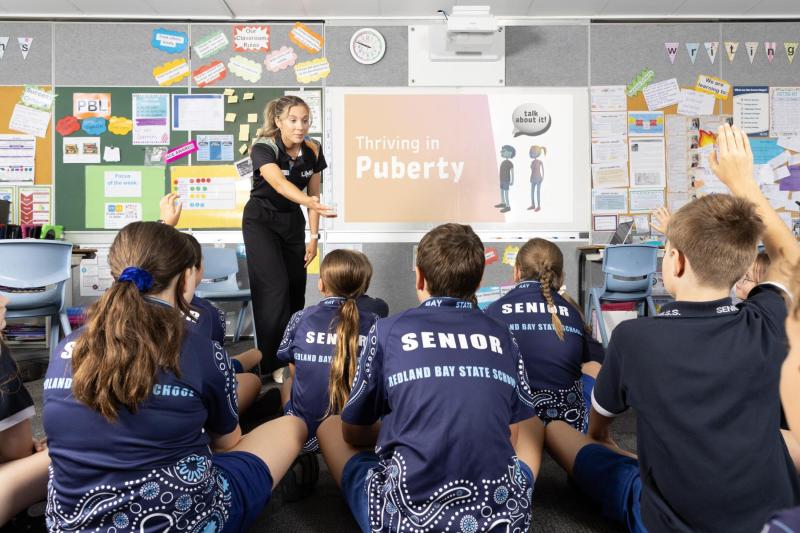
Mary says discussions about personal identity were also extremely relevant and helpful.
“We are from Pakistan, so acknowledging and talking about different cultures and being accepting of different cultures is so important. Each culture is just a different identity.”
Compared to how she felt before the Talk About It program came to her school, Minty says she is now a lot more confident, self-aware and educated.
“Talk About It taught me about hygiene during puberty and about the things that represent my identity. I feel a lot prouder of my identity now,” Minty says.
“I also learned how to calm myself down. I specifically liked the way all the techniques were taught through games and activities,” she says.
Mary says the Talk About It session provided answers and reassurance, and reinforced her own positive influence as a parent.
“Although honestly, I had talked about all these things with Minty before, when the information comes from educators themselves, it really gave a stamp on my words.
“Now she understands what I am saying has some value, because the same is being said by the educator,” Mary says, “but in comparison to my efforts, the Life Education program brought about more changes in her behaviour.”
“There’s a lot that parents are also doing, but sessions like this really do help kids develop their personalities in a positive way. The Talk About It session was at the right time and at the right age as well,” Mary says.
“It gave a lot of answers to the questions that the child is normally facing at that age.”
“As a grandmother, I hear feedback from my family that bullying is such a problem in schools, and this can have a detrimental impact on children not only in their childhood but can continue to affect them psychologically as adults,” Anna says.
“That’s why I started donating to Life Ed Queensland in 2015. When I learned about the charity’s focus on prevention through education – so that children can avoid problems later in life – I knew I wanted to get involved.”
Anna’s insight mirrors the feedback we receive from thousands of Queensland parents of primary school children, who rate bullying and cyberbullying as their top concern.
Sadly, 1 in five Year 4 students experiences bullying on a weekly basis and a third of young people ages 8-17 report unwanted content or contact online.
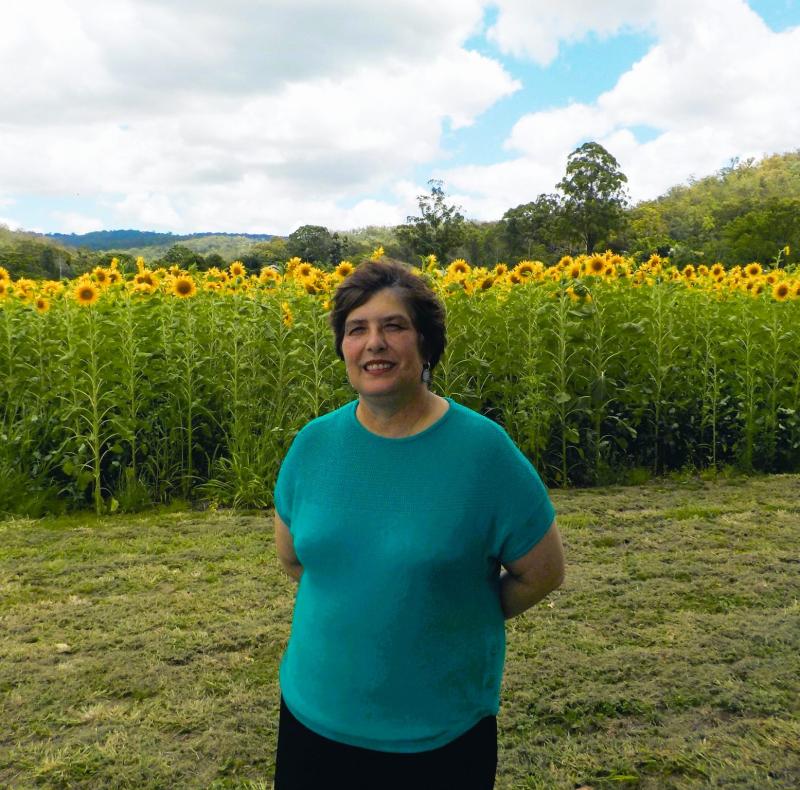
We know that bullied kids are more like to struggle with their academic performance, have more trouble adjusting to secondary school and are more likely to have mental health concerns.
Sometimes, the repercussions of bullying have led to a young person ending their life.
As Anna says, it’s vital that we reach children in the primary school years so that we can start working with them to build awareness about the various forms of bullying, how to stay safe online and seek help, and strategies to build positive relationships with peers in person and online.
“The fact that Life Education focuses on respectful relationships, including friendships and bullying prevention, is very important to me as a donor,” Anna says.
“Life Education – with its commitment to the future generations of Australians – is such a good charity to support.
“It makes me feel good that I can play a small part in providing good coping skills for young children in this increasingly difficult and complex world.”
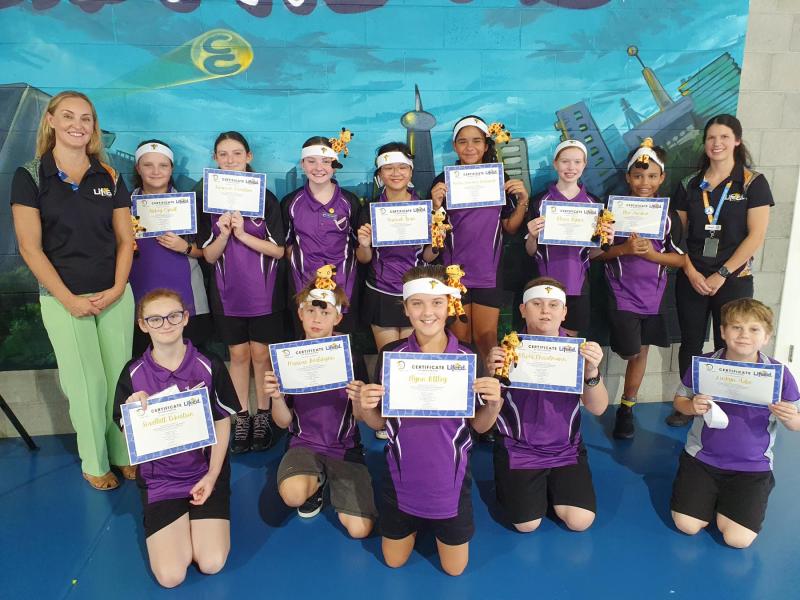
From Karumba, Cairns and Cloncurry to Brookfield, Brisbane and Logan, our dedicated team of educators has taken Life Education to primary schools in every part of the state so far this year.
Through virtual lessons and face-to-face delivery, 18,000 children from schools across Queensland have already participated in a Life Ed session so far this term.
A program highlight, saw senior educator Niccola finalise a two-day Peer Skills workshop at Churchill State School in Ipswich, which began last November, thanks to funding support from Mission Australia Communities for Children. Over two days, 16 senior students were able to learn and practise strategies including active listening, responding, problem solving and wellbeing.
Program Delivery Manager Sue Osmond who assisted with the sessions, says the workshop provided a valuable opportunity to explore new types of program impact.
“Niccola and I attended Churchill’s assembly, and the students were so proud to stand in front of their peers and have it announced to the whole school that they were official peer helpers,” Ms Osmond said.
“The program identifies these students as people in the school community who can be approached for help, making them advocates for a healthy, respectful student dynamic.
“It was a beautiful moment to mark halfway through the term. It was also pretty special that we got big hugs from a few students who were very grateful for our return after the learning engagement part of the program.”
Take a look at our inspiring photo montage to see our program in action so far this year.